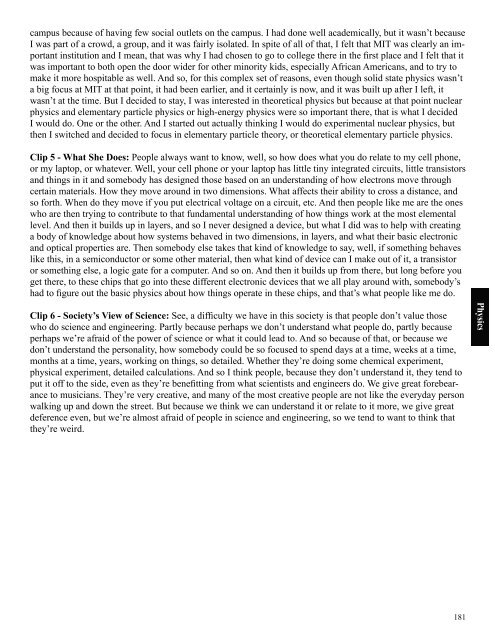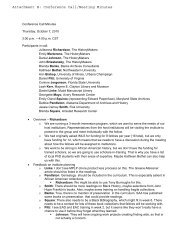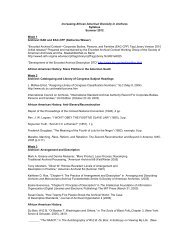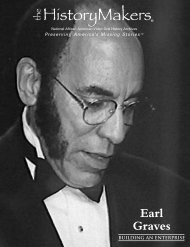ScienceMakers Toolkit Manual - The History Makers
ScienceMakers Toolkit Manual - The History Makers
ScienceMakers Toolkit Manual - The History Makers
You also want an ePaper? Increase the reach of your titles
YUMPU automatically turns print PDFs into web optimized ePapers that Google loves.
campus because of having few social outlets on the campus. I had done well academically, but it wasn’t because<br />
I was part of a crowd, a group, and it was fairly isolated. In spite of all of that, I felt that MIT was clearly an important<br />
institution and I mean, that was why I had chosen to go to college there in the fi rst place and I felt that it<br />
was important to both open the door wider for other minority kids, especially African Americans, and to try to<br />
make it more hospitable as well. And so, for this complex set of reasons, even though solid state physics wasn’t<br />
a big focus at MIT at that point, it had been earlier, and it certainly is now, and it was built up after I left, it<br />
wasn’t at the time. But I decided to stay, I was interested in theoretical physics but because at that point nuclear<br />
physics and elementary particle physics or high-energy physics were so important there, that is what I decided<br />
I would do. One or the other. And I started out actually thinking I would do experimental nuclear physics, but<br />
then I switched and decided to focus in elementary particle theory, or theoretical elementary particle physics.<br />
Clip 5 - What She Does: People always want to know, well, so how does what you do relate to my cell phone,<br />
or my laptop, or whatever. Well, your cell phone or your laptop has little tiny integrated circuits, little transistors<br />
and things in it and somebody has designed those based on an understanding of how electrons move through<br />
certain materials. How they move around in two dimensions. What affects their ability to cross a distance, and<br />
so forth. When do they move if you put electrical voltage on a circuit, etc. And then people like me are the ones<br />
who are then trying to contribute to that fundamental understanding of how things work at the most elemental<br />
level. And then it builds up in layers, and so I never designed a device, but what I did was to help with creating<br />
a body of knowledge about how systems behaved in two dimensions, in layers, and what their basic electronic<br />
and optical properties are. <strong>The</strong>n somebody else takes that kind of knowledge to say, well, if something behaves<br />
like this, in a semiconductor or some other material, then what kind of device can I make out of it, a transistor<br />
or something else, a logic gate for a computer. And so on. And then it builds up from there, but long before you<br />
get there, to these chips that go into these different electronic devices that we all play around with, somebody’s<br />
had to fi gure out the basic physics about how things operate in these chips, and that’s what people like me do.<br />
Clip 6 - Society’s View of Science: See, a diffi culty we have in this society is that people don’t value those<br />
who do science and engineering. Partly because perhaps we don’t understand what people do, partly because<br />
perhaps we’re afraid of the power of science or what it could lead to. And so because of that, or because we<br />
don’t understand the personality, how somebody could be so focused to spend days at a time, weeks at a time,<br />
months at a time, years, working on things, so detailed. Whether they’re doing some chemical experiment,<br />
physical experiment, detailed calculations. And so I think people, because they don’t understand it, they tend to<br />
put it off to the side, even as they’re benefi tting from what scientists and engineers do. We give great forebearance<br />
to musicians. <strong>The</strong>y’re very creative, and many of the most creative people are not like the everyday person<br />
walking up and down the street. But because we think we can understand it or relate to it more, we give great<br />
deference even, but we’re almost afraid of people in science and engineering, so we tend to want to think that<br />
they’re weird.<br />
181<br />
Physics










